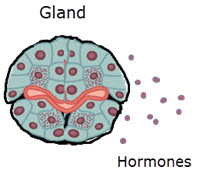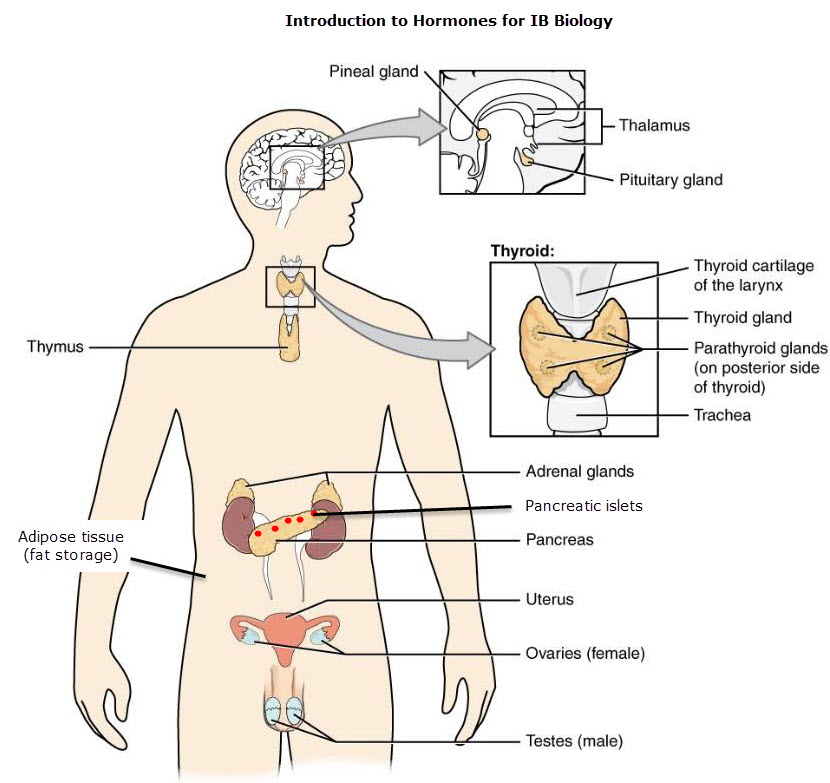Hormones introduction
 Students are introduced to hormones in this lesson using three examples, leptin, thyroxin and melatonin. These examples clearly illustrate the nature of hormones and ideas about homeostasis. After some quick research from four carefully selected webpages students make notes using a sheet of questions and there is a final plenary, a junior doctor speed dating activity.
Students are introduced to hormones in this lesson using three examples, leptin, thyroxin and melatonin. These examples clearly illustrate the nature of hormones and ideas about homeostasis. After some quick research from four carefully selected webpages students make notes using a sheet of questions and there is a final plenary, a junior doctor speed dating activity.
Lesson Description
Guiding Question
- What are hormones?
- How do hormones control parts of the body?
- Name 5 examples of hormones.
Activity 1 - Three hormones - Leptin, Melatonin and Thyroxin
The image below shows the location of human glands. Which of these glands produces leptin, melatonin and thyroxine?

Explore the following four pages to find out the answer to the research questions about these three hormones.
Research questions
- Where is each hormone produced?
- What is it's effect in the body?
- Which cells in the body are affected?
- Can these hormones be used in health care, if 'yes' then explain how?
Activity 2 - Introductory questions
Complete the ![]() Hormones - introductory questions on the worksheet below.
Hormones - introductory questions on the worksheet below.
Activity 3 - Uses of these hormones in medical treatments - Speed dating activity
This is a good plenary activity once the students have begun to understand the three hormones in the examples above.
Speed dating questions
 Students imagine they are going to a junior doctors speed dating night.
Students imagine they are going to a junior doctors speed dating night.
They prepare to impress others by revising about these three hormones,
insulin, leptin and melatonin.
What most impresses junior doctors (of course!) is someone who really knows their medicine.
During each two minute conversation students will ask the following questions and listen carefully to your partners' response.
Junior Dr. speed dating question list
Did you hear about the 'Ice bucket challenge'?
What would happen to someone's thyroxin level if they got really cold?Do you like chocolate?
Can you explain what happens to your leptin levels when your adipose cells get full of lipid?I've been on night shift for three days now, I feel really sleepy at the start of the shift, but I'm wide awake at the end of the shift in the morning. Why do I feel like that? Is it something to do with melatonin?
To begin:
line A students simultaneously ask a question to the person opposite. Students in line B answer the questions.
After 2 minutes - stop.
Students in Line A move one person to the right (the last person should move to the beginning of the line.)
Then students in Line B ask questions from the list questions.
Students repeat the process alternately asking the questions.
Optional - and fun with a group who get on well with each other
Students might want to be creative and think up chat-up lines, like, "You must have lots of thyroxine, you look really hot!"
At the end of the discussion each student declares which person they think would be the best "junior doctor date".
Teacher's notes
Some students might know about hormones from previous study, but this lesson assumes that they have only a little prior knowledge. It would be possible to set the questions as a homework task for students who have studied hormones before.
Activity 1 is a quick web search. The pages have been chosen because the level and the terminology matches the IB guide quite well, and they are short and informative. Students are asked to make their own simple notes.
Activity 2 consolidates the student's note taking and some students will need to read their sources again because their notes were not detailed enough. Other students with good notes will complete this activity quickly. This could be a teaching point.
Activity 3 could be a bit of fun. With a class who all respect each other and there are no friendship worries the activity can be run as speed dating as described. If you want to keep the tone more formal this is an adaptation of something called a "line dialogue" activity. The questions can be given out and students simply answer the questions alternately in a line. This is good at mixing up students and getting them to work with others, brighter students who answer very well will be sharing their ideas with the whole class, and everyone gets several chances to improve their answers.
Extra resource
This video is a very nice intro to leptin - http://bcove.me/ii7750hu

 IB Docs (2) Team
IB Docs (2) Team
